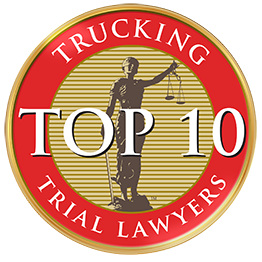Negligent tailgating can cause devastating accidents and injuries with major financial implications. Our acclaimed truck accident attorneys will help you pursue justice when a trucker’s negligence has harmed you. Wilshire Law Firm has recovered more than $1 billion for our clients. Get started on a free and confidential evaluation of your personal injury case.
Table of contents
How an Attorney Can Help if Tailgating Injures You

If a tailgating accident injures you, the experienced truck accident attorneys at Wilshire Law Firm can help you in several ways, including
- Investigating the accident: Our team can thoroughly investigate the accident, gather evidence, and identify witnesses. The investigation can help build a solid case to prove that the tailgating driver was at fault for the accident.
- Negotiating with the insurance company: Our truck tailgating accident attorneys can deal with the insurance company to ensure you receive fair compensation for your injuries and damages. Insurance companies often try to settle for as little as possible. We’ll fight for the compensation you deserve.
- Filing a lawsuit: If negotiations with the insurance company fail to produce a fair settlement, our seasoned truck accident injury lawyers can file a lawsuit. Filing a lawsuit can help you recover compensation for medical expenses, lost wages, pain and suffering, and other damages resulting from the accident.
- Representing you in court: If your case goes to court, we can represent you and argue your case before a judge or jury. We aim to get the compensation you deserve and hold the negligent driver accountable for their actions.
Legal advice: Throughout the legal process, our trucking attorneys can provide legal advice and answer any questions. This advice can help you understand your rights and options and make informed decisions about your case.
Liability and Negligence: Who is Responsible for Tailgating Accidents?
In a tailgating accident, determining liability and negligence is essential to decide who is responsible for the damages and injuries. Liability is the legal responsibility for one’s actions, and negligence is the failure to exercise reasonable care in a particular situation. Here are some key points to consider when determining liability and negligence in tailgating accidents:
- The tailgating driver is negligent because they are not maintaining a safe distance from the vehicle in front of them.
- If the motorist in front suddenly stops or slows down, the tailgating driver may not have enough time to react, making them responsible for the collision.
- If the driver in front is also driving recklessly or erratically, they may share some of the responsibility for the accident, even if they were not tailgating.
- Both drivers may sometimes share fault for the accident if they were driving negligently or violating traffic laws.
When determining liability, it is essential to gather evidence from the accident scene. This may include taking photos and videos of the accident scene, damaged vehicles, reviewing the police report, gathering witness statements, exchanging information with other parties, and other relevant information. This evidence can help determine who was at fault for the accident and what damages and injuries happened.
Regarding legal responsibility, the driver found to be at fault for the accident may be held liable for the damages and injuries. They include compensatory damages, such as medical expenses and lost wages, and punitive damages in cases where the driver’s behavior was reckless or negligent.
idence and expert witnesses to support the injured party’s case. Here are some key points to consider when establishing negligent tailgating in court:
- Evidence of tailgating behavior can include witness statements, police reports, and video footage from the area’s dashboard or surveillance cameras.
- The injured party’s medical records and bills can also serve as evidence of the damages resulting from the accident.
- Expert witnesses, such as accident reconstruction specialists, can analyze the evidence and provide testimony regarding the cause of the accident and the tailgating driver’s negligence.
- Other expert witnesses, such as medical professionals, can testify to the extent and severity of the injured party’s injuries and damages.
When presenting evidence in court, it is essential to provide a concise argument demonstrating the tailgating driver’s negligence and the resulting damages and injuries. As an injured party’s attorney, Wilshire Law Firm can help gather and present the evidence and coordinate with expert witnesses to ensure their testimony supports the case.

Injuries Associated With a Tailgating Accident
Truck tailgating accidents are common on busy highways and can result in serious injuries. These injuries can have long-term effects and require extensive medical treatment and rehabilitation. Some of the most frequently seen are as follows:
Whiplash is a common injury in tailgating accidents, caused by the sudden back-and-forth movement of the head and neck. Whiplash can result in neck pain, headaches, and restricted movement. In more severe cases, whiplash can cause nerve damage and chronic pain.
Traumatic brain injury (TBI) can occur when the head hits a hard surface, such as the windshield or side window. TBIs can range from mild concussions to severe injuries that cause permanent damage to the brain. Symptoms of TBI can include headaches, dizziness, confusion, and memory loss.
Spinal cord injuries are another serious consequence of tailgating accidents. These injuries can range from mild to severe and may result in paralysis, loss of sensation, or other lifelong disabilities.
Chest injuries frequently occur when the driver’s or passenger’s chest hits the steering wheel or dashboard upon impact. These injuries can range from bruises and broken ribs to more severe internal injuries, such as punctured lungs or ruptured organs.
Lacerations and contusions are common. These injuries can happen when the collision’s shattered glass or other debris hits the vehicle’s occupants. These injuries can range from minor cuts and bruises to more severe ones requiring stitches or further medical attention.
Facial injuries can occur when the driver’s or passenger’s face hits the steering wheel, dashboard, or airbag during the collision. These injuries can range from minor cuts and bruises to more severe injuries such as fractures, dislocations, or dental damage.
Injuries to the arms and legs are also common in tailgating accidents. They occur when the arms or legs are thrown forward and hit the dashboard or other parts of the car upon impact. They can range from minor cuts and bruises to more severe injuries such as fractures or dislocations.
Soft tissue injuries are also common in tailgating accidents. These injuries occur when the body’s soft tissues, such as muscles, tendons, and ligaments, are stretched or torn. Soft tissue injuries can cause pain, swelling, limited mobility and can take several weeks or months to heal.
Psychological trauma is also a possible outcome of a tailgating accident. Even if there are no physical injuries, the emotional impact of the accident can be significant. The stress and anxiety of the accident can lead to post-traumatic stress disorder (PTSD) and other psychological problems, which may require ongoing therapy and support.
Disclaimer: Mentions and discussions about injuries do not constitute medical advice. Always seek medical professionals when dealing with injuries.
Understanding Negligent Tailgating: Definition and Examples

Negligent tailgating is a driving behavior that involves following another vehicle too closely and failing to maintain a safe distance. This behavior is hazardous and is one of the leading causes of car accidents on our roads. When drivers are in a hurry, impatient, or trying to intimidate or harass other motorists, tailgating occurs.[1]
Negligent tailgating is a form of reckless driving and is considered a violation of traffic laws in most jurisdictions.
Here are some examples of negligent tailgating: Driving too close to the vehicle in front when the road is wet or slippery increases the risk of a collision if the leading car or truck has to brake suddenly.
- Following a slow-moving vehicle too closely on a highway or construction zone increases the risk of a rear-end collision.
- Tailgating a motorcycle or bicycle can cause the rider to feel threatened and lose control of their vehicle.
- Driving too close to a truck or a large vehicle can reduce the tailgating driver’s visibility. This lack of visibility creates a dangerous situation if the leading car needs to change lanes suddenly.
Negligent tailgating is a serious offense that can have severe consequences. In addition to putting the lives of drivers and passengers at risk, tailgating can also result in costly property damage and expensive medical bills. If you suffered trauma in an accident caused by negligent tailgating, you may be entitled to compensation for your injuries and other losses. It’s essential to consult with an experienced personal injury attorney to understand your legal rights and options. Call Wilshire Law Firm 24/7 to schedule your free case consultation.
Frequently Asked Questions About Negligent Tailgating
What Is a Tailgating Accident?
A tailgating accident is when one vehicle rear-ends another vehicle that is directly in front of it. Typically, the driver of the first vehicle has little to no reaction time to avoid a collision as they may be following too closely or not paying enough attention. Tailgating accidents can range in severity depending on the speed and size of the vehicles involved.
What is the most common reason for negligent tailgating?
The most common reason for negligent tailgating is distracted driving. Truck drivers may become distracted by cell phone use and not pay close enough attention to the road ahead. Negligent tailgating also includes other dangerous behaviors like changing lanes without first checking mirrors and signaling or speeding up very quickly when the opportunity arises.
Free Case Review with a Semi-Truck Tailgating Accident Law Firm
The practice of tailgating is common, and there are numerous legal repercussions. The trucking company has a team of lawyers trying to avert the blame. Equalize the playing field. Contact an experienced truck accident attorney for wrecks caused by tailgating at Wilshire Law Firm. Reach out to a personal injury lawyer. Call us 24/7 at (800) 501-3011. Since we bill on a contingency basis, you pay no fees unless you win.











